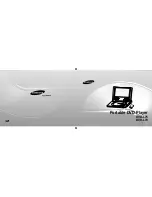
PROTEZIONI
Il regolatore elettronico SR7 al fine di evitare
anormali e pericolosi funzionamenti del-
l’alternatore e’ provvisto di una protezione di
bassa velocita’ e di una per il sovraccarico.
Protezione bassa velocita’:
Il suo intervento e’ istantaneo e provoca la
riduzione della tensione di macchina
quando la frequenza scende al di sotto del
10% di quella nominale.
La soglia di intervento si regola agendo sul
potenziometro “Hz”.
Protezione di sovraccarico:
Un opportuno circuito compara la tensione
parzializzata di eccitazione.
Se per piu’ di 20 secondi viene superato il
valore prestabilito per tale tensione (valore a
cui corrisponde un valore di corrente di ca-
rico uguale a 1,1 volte la corrente di targa
dell’alternatore), il regolatore interviene ab-
bassando la tensione di macchina con con-
seguente limitazione della corrente entro va-
lori di sicurezza.
Il ritardo e’ appositamente inserito per per-
mettere lo spunto dei motori che normal-
mente si avviano in 5÷10 secondi.
Anche questa soglia di intervento e’ regola-
bile agendo sul potenziometro “AMP”.
CAUSE CHE PROVOCANO
L’INTERVENTO DELLE PROTEZIONI.
Intervento istantaneo protezione bassa
velocita’:
1 - velocita’ ridotta del 10% rispetto ai dati
di targa.
Intervento ritardato protezione sovrac-
carico :
2 - sovraccarico del 10% rispetto ai dati di
targa.
3 - fattore di potenza (cos
ϕ
) inferiore ai dati
di targa.
4 - temperatura ambiente oltre i 50°C.
Intervento di entrambe le protezioni :
5 - combinazione del fattore 1 con i
fattori 2, 3, 4.
Nel caso di intervento delle protezioni, la
tensione erogata dall’alternatore scendera’
fino ad un valore che dipendera’ dall’entita’
dell’anomalia.
La tensione tornera’ automaticamente al
suo valore nominale qualora venga a ces-
sare l’inconveniente.
Dopo aver eseguito tutti i collegamenti elet-
trici e
solo dopo aver chiuso tutte le prote-
zioni
e’
possibile effettuare la prova di primo
avviamento del sistema.
ACCOPPIAMENTO
ELETTRICO
22
ELECTRICAL
CONNECTIONS
PROTECTIONS
The SR7 electronic regulator is equipped
with a low speed safety device as well as an
overload safety device to prevent irregular
and dangerous operation of the alternator.
Low speed safety device:
It is activated immediately to reduce the ma-
chine voltage when the frequency decrea-
ses to less than 10% of the rated value.
The activation level can be regulated using
the “Hz” potentiometer.
Overload safety device:
A special circuit is used to compare the
partial excitation voltage.
If, for a period longer than 20 seconds, this
voltage is higher than the pre-set value
(which corresponds to a charging current
equal to 1,1 times the current indicated on
the alternator data plate), the regulator is
activated and lowers the machine voltage,
thereby limiting the current to a safe amount.
The time delay is specifically set to give the
motors time to pickup, as they usually re-
quire about 5÷10 seconds to start.
This activation level can be regulated using
the “AMP” potentiometer.
INTERVENTION OF PROTECTION DE-
VICES CAUSES.
Underspeed protection instantaneous in-
tervention :
1 - speed reduced by 10% of nominal RPM
Delayed intervention of overload protec-
tion :
2 - overload by 10% of nominal rating.
3 - power factor (cos
ϕ
) lower than the
nominal-one.
4 - ambient temperature above 50°C.
Intervention of both protections :
5 - combination of factor 1 with factors
2, 3, 4.
In case of intervention the output voltage will
drop down to a value which will depend on
the fault.
The voltage will return automatically to its
nominal value as soon as the fault is remo-
ved.
After all the electric connections have been
made and
only after all the protections
have been put in place,
can the system be
started.
















































